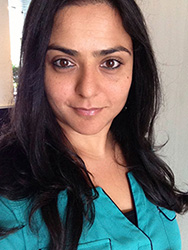Seeking Help for Eating Disorders By Dr. Henah Gupta
Author by Dr. Henah Gupta

If you or someone you know is struggling with food, weight or body image issues; it is important for you to continue to read through this article. My goal in writing for this magazine is to help in community awareness and education about what eating disorders are and the importance of receiving help to overcome them.
Eating disorders are a form of mental disorder characterized by a persistent disturbance in eating and eating related behavior that significantly impairs one’s physical and/or psychosocial functioning. There are a variety of eating disorders, all of which present with underlying issues in emotional functioning. Some individuals may see their body in a distorted manner where they over evaluate their size. Some people may place an excessively high level of importance on their weight and size. Three main types have been identified which are Anorexia Nervosa, Bulimia Nervosa and Binge Eating Disorder.
 Individuals with Anorexia Nervosa have a six‐fold increase in mortality than the general population. People struggling with this have an intense fear of weight gain may refuse to eat and are extremely picky about what they eat. These individuals are low weight and engage in behavior that interferes with weight gain. Individuals with Anorexia Nervosa have a six‐fold increase in mortality than the general population. People struggling with this have an intense fear of weight gain may refuse to eat and are extremely picky about what they eat. These individuals are low weight and engage in behavior that interferes with weight gain.
Bulimia Nervosa is characterized by consuming very large volumes of food and then in turn engaging in behavior to remove food/calories from their body such as over exercising, purging behavior, fasting, laxative or diuretic abuse. Binge eating disorder involves consuming very large volumes of food repeatedly and feeling out of control with their food consumption. If someone you know is struggling with these kinds of symptoms, it is important to encourage them to seek professional help. Eating disorders are detrimental to one’s physical and emotional health and can become chronic and difficult to treat over time as the illness progresses. Eating disorders may especially compromise the functioning of their endocrine, dental, cardiac and gastrointestinal systems.
Additional resources online can be found at: |

Dr. Henah Gupta is a Licensed Clinical Psychologist. She received both her master’s and doctorate degrees in Clinical Psychology from Nova Southeastern University. Her undergraduate education was completed at the University of Florida. Her current areas of expertise include the treatment of eating disorders, trauma, substance abuse, mood disorders, and personality disorders. She holds professional membership to the American Psychological Association, The International Association of Eating Disorder Professionals and the National Eating Disorder Association. To contact Dr. Gupta or learn more, visit http://www.psychologi
|



 Treatment for eating disorders may involve medical stabilization, psychoeduaction, cognitive behavioral therapy (acceptance and commitment therapy or dialectical behavior therapy) and nutritional counseling. In some cases patients are encouraged to seek psychiatric help to deal with any accompanying symptoms of depression, anxiety, obsessive-compulsive disorder and/or any other related or additional psychopathology. In cases of Anorexia, patients are recommended to initially complete a residential/inpatient treatment in order to be reefed under medical supervision.Cultural values and family values impact the way in which we perceive and experience life, which in turn impacts our behavioral choices. One of the challenges I find with the South Asian community is the presence of stigma with getting psychological help and/or the tendency to minimize an individual’s emotional struggles. People with eating disorders often struggle with shame and fear of being viewed as problematic. They may struggle with wanting to be perceived in a positive light and as doing well. Families of South Indian descent may find it difficult to be open about such struggles and may make unhelpful comments that are perceived as critical or rejecting, which may further exacerbate the problem. It is sometimes recommended that individuals struggling with eating disorders also receive family therapy. This can help their loved ones understand more about the mental health pathology and how to best be helpful in that individual’s recovery.
Treatment for eating disorders may involve medical stabilization, psychoeduaction, cognitive behavioral therapy (acceptance and commitment therapy or dialectical behavior therapy) and nutritional counseling. In some cases patients are encouraged to seek psychiatric help to deal with any accompanying symptoms of depression, anxiety, obsessive-compulsive disorder and/or any other related or additional psychopathology. In cases of Anorexia, patients are recommended to initially complete a residential/inpatient treatment in order to be reefed under medical supervision.Cultural values and family values impact the way in which we perceive and experience life, which in turn impacts our behavioral choices. One of the challenges I find with the South Asian community is the presence of stigma with getting psychological help and/or the tendency to minimize an individual’s emotional struggles. People with eating disorders often struggle with shame and fear of being viewed as problematic. They may struggle with wanting to be perceived in a positive light and as doing well. Families of South Indian descent may find it difficult to be open about such struggles and may make unhelpful comments that are perceived as critical or rejecting, which may further exacerbate the problem. It is sometimes recommended that individuals struggling with eating disorders also receive family therapy. This can help their loved ones understand more about the mental health pathology and how to best be helpful in that individual’s recovery.


























